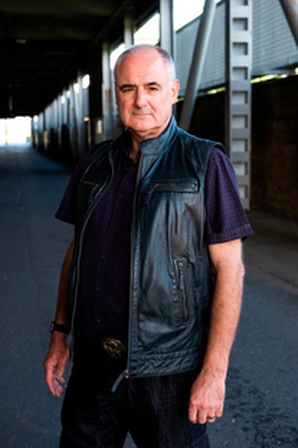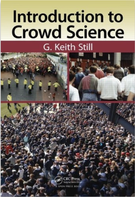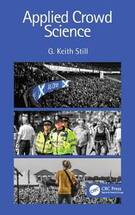
Keith has consulted on some of the world’s largest, and most challenging crowd safety projects. He is the visiting Professor of Crowd Science at the University of Suffolk and teaches short courses around the world from entry level risk awareness and risk reporting, Level 3 (supervisor) Level 5 (crowd management planning and operations) to Level 7 (MSc). One of Keith's course's is mandatory training for UK Police Public Event Commanders. In 2019, he moved all his teaching programmes online (www.GKSed.com) and have several thousand international learners. The courses are aimed at event organisers, police, first responders, emergency planners, city authorities, building control officers, licensing officers, architects, event managers, security companies, venue operators and consulting engineers. |
Delegate quotes
“Keith Still’s workshops have focussed the minds of many people in realising just how easy it can be for disaster to occur, and equally how simple the solutions often are.” Eric Stuart, former Metropolitan Police Event Planner for Notting Hill Carnival and London New Year Events and former chair of the Global Crowd Management Association
Shannan Tiffin, Captain of Support Services/Emergency Management at Duke University Police Department, found the workshop to be very beneficial. “There is not a lot out there about crowd behaviour and psychology,” said Tiffin. “The workshop provided us with a simplified approach to understanding the behaviours of how people act, and ingress and egress from a venue or stadium.” NCS4 course (USA)
Rebecca Wilusz, Associate Director of Game Operations and Champion at Duke University Athletics, agrees with Tiffin. “Keith has done a great job of making the information accessible – I have left the workshop with both simple and effective tools to be able to build better plans and train our athletics staff more efficiently. NCS4 course (USA)
“A fantastic and beneficial course, it was the only course I had ever done where I was upset when it finished, the course provides a unique and mathematical approach to crowd engineering, the consensus of all who attended was that it provided us with the tools and confidence to do our job” Operations Manager. Sydney Opera House (Australia)
“This course opens your eyes to the potential issues with Mass Gatherings. As well as providing an individual with the tools and knowledge to assess the event plans and proposed mitigation for major events. With the introduction of the Crowd Science Qualification it would be in your best interest to attend. The delivery and information provided is beyond reproach and glad to see the course in Australia!” CEO. Canberra Exhibition Park (Australia)
"These courses were invaluable enabling me to illustrate quickly and precisely any issues that arose at the venues we attended and pass on my recommendations to the security team in a manner the was easily understood." Dave Wilkie, Event Safety Officer, U2 360 European Tour
Publications
“Keith Still’s workshops have focussed the minds of many people in realising just how easy it can be for disaster to occur, and equally how simple the solutions often are.” Eric Stuart, former Metropolitan Police Event Planner for Notting Hill Carnival and London New Year Events and former chair of the Global Crowd Management Association
Shannan Tiffin, Captain of Support Services/Emergency Management at Duke University Police Department, found the workshop to be very beneficial. “There is not a lot out there about crowd behaviour and psychology,” said Tiffin. “The workshop provided us with a simplified approach to understanding the behaviours of how people act, and ingress and egress from a venue or stadium.” NCS4 course (USA)
Rebecca Wilusz, Associate Director of Game Operations and Champion at Duke University Athletics, agrees with Tiffin. “Keith has done a great job of making the information accessible – I have left the workshop with both simple and effective tools to be able to build better plans and train our athletics staff more efficiently. NCS4 course (USA)
“A fantastic and beneficial course, it was the only course I had ever done where I was upset when it finished, the course provides a unique and mathematical approach to crowd engineering, the consensus of all who attended was that it provided us with the tools and confidence to do our job” Operations Manager. Sydney Opera House (Australia)
“This course opens your eyes to the potential issues with Mass Gatherings. As well as providing an individual with the tools and knowledge to assess the event plans and proposed mitigation for major events. With the introduction of the Crowd Science Qualification it would be in your best interest to attend. The delivery and information provided is beyond reproach and glad to see the course in Australia!” CEO. Canberra Exhibition Park (Australia)
"These courses were invaluable enabling me to illustrate quickly and precisely any issues that arose at the venues we attended and pass on my recommendations to the security team in a manner the was easily understood." Dave Wilkie, Event Safety Officer, U2 360 European Tour
Publications
- Still G. K. New Computer system can predict human behaviour response to building fires. Fire 84 (January 1993), 40-41
- Still G. K. Towering Inferno New Scientist (Supplement April 1993).
- Still G. K. New Insights into Crowd Behaviour - It's Fractal. Focus November (1994).
- Still G. K. Simulating Egress using Virtual Reality - a perspective view of simulation and design. IMAS Fire Safety on Ships symposium (May 1994).
- Still G. K. The Secret Life of crowds. Focus (June 1996)
- Still G. K. Last word, mind the gap. New Scientist (March 20th 1999).
- Reynolds, L. Fielden, I, Still, G. K, Stewart, I. "Wirequakes - a question of seismology" with Len Reynolds and Ian Stewart - a paper comparing earth and wire quakes (Wire Industry, December 1999).
- Still G. K. Optimising Office Egress. Web based publication (Sept 2001)
- Still G. K. "Agincourt" Chapter in book "Battlefield Detectives" ISBN 0-233-05083-3
- Still, Impact – Journal of Operations Research, “Crowd science and crowd counting” March 2019
- Parker, C. & Still, K., 2020. Proposing the lower bounds of area needed for individuals to social distance across a range of town centre environments, Institute of Place Management (working paper)
- Still, Papalexi "Place crowd safety, crowd science? Case studies and application” Journal of Place Management and Development, 2020. Emerald Publishing Limited 1753-8335 DOI

